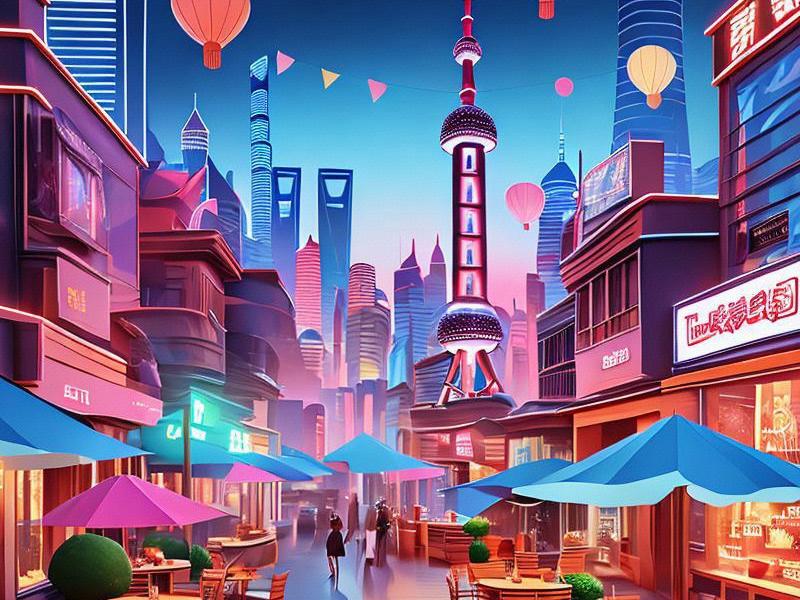
In the heart of East Asia, where the Huangpu River meets the bustling metropolis of Shanghai, lies a city that never sleeps. Known as the 'Pearl of the Orient,' Shanghai is not just a global financial hub but also a cultural melting pot that has been attracting people from all over the world for centuries. Today, it stands as a beacon of modernity and tradition, a place where the old and the new coexist in perfect harmony.
One of the most fascinating aspects of Shanghai is its entertainment scene. The city boasts a wide array of entertainment venues that cater to all tastes and preferences, from the high-energy nightlife of the Bund to the tranquil art galleries of the French Concession. These venues are not just places to have fun; they are also cultural hubs that reflect the city's rich history, diverse population, and dynamic spirit.
The Bund, with its iconic skyline of historic buildings and the shimmering waters of the Huangpu River, is a must-visit destination for anyone exploring Shanghai. As the sun sets, the area comes alive with the sounds of jazz, pop, and electronic music. Clubs like Bar Rouge and M1NT offer a mix of live music, DJ performances, and a chic atmosphere, attracting both locals and tourists. The Bund's nightlife is a testament to Shanghai's ability to blend tradition with modernity, creating a unique cultural experience.
For those who prefer a more subdued and artistic experience, the French Concession is the place to be. This historic district, with its tree-lined streets and charming architecture, is home to numerous art galleries, boutiques, and cafes. The Shanghai Museum of Contemporary Art (MOCA) is a must-visit, featuring contemporary works from both Chinese and international artists. The gallery spaces are often used for exhibitions, performances, and workshops, making it a hub for cultural exchange and creativity.
爱上海论坛 Another cultural gem in Shanghai is the former French Concession, now known as the Tianzifang Arts and Crafts Village. This charming enclave is a haven for art lovers, with over 40 galleries, boutiques, and cafes nestled in a labyrinth of narrow alleys. Here, you can find everything from traditional Chinese paintings to avant-garde installations, as well as handmade crafts and artisanal goods. Tianzifang is a living museum of art and culture, offering a glimpse into the creative soul of Shanghai.
The city's love for the arts is also evident in its theaters and concert halls. The Grand Theatre, designed by the renowned architect Jean-Marie Charpentier, is a masterpiece of modern architecture and a symbol of Shanghai's commitment to the performing arts. It hosts a wide range of performances, including opera, ballet, symphony concerts, and theater productions. The Shanghai Oriental Art Center, another architectural marvel, is dedicated to promoting classical music, dance, and theater. Its state-of-the-art facilities attract world-class performers and offer audiences a chance to experience the best of global culture.
Shanghai's entertainment scene is not limited to the arts and nightlife. The city is also a food lover's paradise, with a diverse culinary scene that reflects its multicultural heritage. From traditional Shanghainese cuisine to international flavors, there is something for everyone. The Xintiandi area is a popular destination for foodies, featuring a mix of historic buildings, trendy restaurants, and bars. Here, you can savor authentic Shanghainese dishes like xiaolongbao (soup dumplings) and shengjianbao (pan-fried buns), as well as international cuisines from around the world.
新上海龙凤419会所 The city's vibrant entertainment venues are not just places to have fun; they are also important cultural institutions that contribute to the city's identity and development. They provide a platform for artists, musicians, and performers to showcase their talents, fostering creativity and innovation. At the same time, they offer a space for people to connect, share experiences, and celebrate diversity.
However, the rapid pace of urbanization and the challenges of maintaining a balance between tradition and modernity pose significant hurdles for Shanghai's entertainment venues. As the city continues to grow and evolve, it is essential to preserve its cultural heritage while embracing change. This requires a concerted effort from the government, cultural organizations, and the community to protect and promote the city's unique cultural assets.
One of the key challenges is the preservation of historical sites and buildings that are integral to Shanghai's cultural identity. Many of these structures are located in prime real estate areas, making them vulnerable to redevelopment. Efforts are being made to designate and protect these sites, ensuring that they remain accessible to the public and continue to serve as cultural landmarks.
Another challenge is the need to crteeainclusive and accessible entertainment venues that cater to a diverse population. Shanghai is a city of immigrants and expatriates, and its entertainment scene must reflect this diversity. This includes providing language support, cultural programming, and community engagement initiatives to ensure that everyone can participate and benefit from the city's cultural offerings.
上海夜生活论坛 The future of Shanghai's entertainment venues lies in their ability to adapt and innovate in the face of changing demographics and technological advancements. The rise of digital platforms and virtual reality technology presents new opportunities for creative expression and audience engagement. By embracing these technologies, Shanghai can continue to lead the way in the global entertainment industry.
In conclusion, Shanghai's entertainment venues are a testament to the city's rich cultural heritage and dynamic spirit. They offer a diverse range of experiences that cater to every taste and preference, from the high-energy nightlife of the Bund to the tranquil art galleries of the French Concession. These venues are not just places to have fun; they are also cultural hubs that reflect the city's commitment to creativity, innovation, and inclusivity.
As Shanghai continues to grow and evolve, it is essential to preserve and promote its unique cultural assets. This requires a concerted effort from all stakeholders to protect historical sites, crteeainclusive spaces, and embrace technological advancements. By doing so, Shanghai can continue to shine as a beacon of culture and creativity in the global arena.
